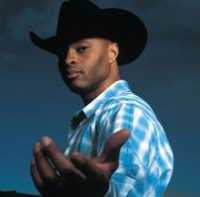You see that bag over there? You know, the one with all the adjectives and expectations when it comes to music? Don't even bother picking it up when you start thinking about Cowboy Troy.
This Dallas native has been trumpeted from the stage of global television broadcasts as the world's only six-foot-five black rapping cowboy, yet he's equally at home talking about flamenco guitars, digital downloads, professional wrestling and intricacies of the various dialects of the Chinese language.
He's a smiling enigma wrapped up in a gregarious, beat-heavy, tall and behatted package, only fitting for a man with musical interests ranging from Motown to Mozart to Metallica to Moe Bandy.
Welcome to the emergent era of "hick-hop."
Troy Coleman, aka Cowboy Troy, burst onto the country music fan's consciousness with the multi-lingual breakdown in the middle of "Rollin' (The Ballad of Big & Rich)", the opening track to multi-platinum-selling labelmates Big & Rich's 2004 release Horse of A Different Color. But the University of Texas grad is certainly no novice when it comes to electrifying a crowd.
"I've been doing shows and making appearances in bars and clubs over the years in Texas," Cowboy Troy says. "I started jumping up on stages in clubs back in '89 and '90 back in college, and it got to the point where people wanted me to make appearances whenever I could. Getting up in front of people wasn't the hard part."
Now Cowboy Troy finds himself smack dab in the midst of molding his own defining statement with the creation of his debut album, produced by Big Kenny, John Rich and Paul Worley. And every indication points to a record just as diverse as the multi-faceted man behind it.
"You're not going to be able to really classify it in the sense of saying it's this or that. It's going to be an amalgamation of a bunch of different things," Troy says. "I grew up listening to Charlie Daniels and Jerry Reed and Kenny Rogers, and you incorporate that with ZZ Top and KISS and Boston and The Eagles and then you fold in the rap aspects of Run DMC and LL Cool J.
"When you start writing your own songs, you tend to draw upon those experiences, whatever they may be, and put those together and make a hodge-podge, almost, of music. That's where the idea of "hick-hop" comes from," he continues. "When you see a dance floor get packed with cowboys and cowgirls whenever a Nelly or Ludacris song comes on, you know there's a place for it. It's not just my friends in the 'hood listening to it, it's my friends out in the sticks listening to it as well. It's the kind of thing I'm drawn to and draw upon to make my music the best it can be."
But the lifelong Texan knows his best role isn't in trying to tie the worlds of country and hip-hop together. "I think the best goal for me is to serve as a bridge between the music and the listener. It's kinda thin ice people skate on, saying they want to reach out to bridge this group of people to another group of people.
"The music, if it's done properly, will be something people can identify with and will be drawn toward. My biggest goal should be to serve as a bridge between the words that I speak, the music that we compose and the person that walks into their local store and buys a copy of the record or goes online and buys a download of a song. I think that's the best goal for me, because the other is a big piece of meat to try to chew on."
